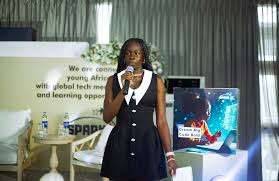In a bold stride toward reshaping Africa’s digital future, 17-year-old Camille Ananyi has launched SPARK Tech Africa, a tech-mentorship platform aimed at connecting African girls with global leaders in technology. The initiative is already generating buzz for its promise to bridge a critical gap in mentorship, access, and opportunity.
Camille, who split her upbringing between Lagos and California, says SPARK is a response to the isolation she experienced early in her tech journey. “I learned to code through CcHub and summer camps in the U.S., but I always wondered—what happens to the girls who don’t have that access?”
Her answer is SPARK: Support Passionate Africans through Relationships, Knowledge, and Tech — a platform designed to offer what traditional classrooms and even most bootcamps do not: sustained guidance from people who’ve walked the tech path.
How SPARK Works
The SPARK platform blends self-paced learning with human connection. Its features include:
A Learn section with beginner-friendly resources on coding, AI, and cybersecurity.
A Matching system that pairs girls with global mentors for weekly 1:1 virtual meetings.
A Women’s Stories corner showcasing mentor journeys across continents.
A Progress Tracker to help mentees monitor learning and milestones.
A Final Showcase, where the top participants are selected for a fully-funded summer tech camp in Silicon Valley.
Applications are open to girls aged 13–18, and the programme runs from December through April.
Reframing Mentorship in African Tech
SPARK is not the first African initiative aimed at improving girls’ digital skills, but it may be the first to fuse tech with emotional support at this scale.
“There are thousands of coding platforms. What’s missing is continuity, someone saying: ‘I believe in you, week after week,’” Camille said in an earlier interview.
This consistency, experts say, is often what separates passive learning from actual career pathways
Why It Matters
SPARK is about more than syntax and software. It encourages girls to build real-world projects—from climate monitoring apps to health AI models—with guidance from women who’ve worked at companies like Microsoft, Andela, and Stripe.
The top cohort graduates earn a chance to attend a curated tech summer experience in Silicon Valley, where they pitch their projects, visit innovation hubs, and shadow mentors in real-time work environments.
SPARK’s emergence comes at a time when Africa’s digital economy is growing, but not equitably. Millions of girls remain underrepresented in science and tech fields.
Analysts say Camille’s platform, if scaled, could quietly revolutionize talent pipelines. “Mentorship is infrastructure,” one Lagos-based developer said. “If we keep building it with intention, girls from Enugu or Kano can co-lead the next AI wave.”
Applications for the 2025–2026 SPARK cohort are now open. Visit project-spark.org to apply.
Talking Points
This Isn’t Just a Feel-Good Story—It’s a Challenge to Institutions. Camille Ananyi’s SPARK Tech Africa isn’t simply another mentorship platform—it’s a direct indictment of what schools, governments, and even some tech hubs have failed to do: sustain mentorship, not just hand out tools.
In a continent brimming with “digital inclusion” rhetoric, it takes a 17-year-old to build what multibillion-naira programs haven’t—human connection at scale.
Mentorship Is Infrastructure. Why Aren’t We Funding It Like Roads? The success of Africa’s digital economy won’t just come from laptops and fibre cables—it’ll come from relationships, from mentoring networks that prevent dropout and burnout in young talent.
SPARK’s 1-on-1 global mentorship model should force policymakers and funders to ask: Why do we treat mentorship as charity instead of economic policy?





